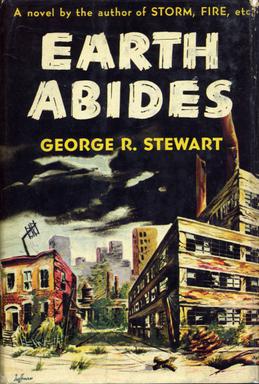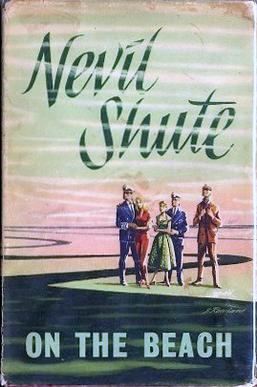This is not the first time in my life when the tone for the Zeitgeist was set by Nevil Shute's novel,
On The Beach.
There were moments in the '60s and '70s (think Cuban Missile Crisis and Peak Oil) when the final scenes of the novel (spoiler alert: everybody dies) drifted in and unsettled my consciousness. Even though the book's disaster involved nuclear radiation (rather than pestilence), my having spent a few formative years in Japan not long after the end of the second world war (and having visited what little remained of Hiroshima at the tender age of seven) managed to paint all forms of doom with a single brush.
So I wasn't surprised when, as the new virus grew into a pandemic, I remembered that palpable sense of foreboding--not dissimilar to the air raid-like sirens used to call the Eloi to Morlock dinner-time in the 1960 film version of
The Time Machine. I still get creeped out every first Saturday of the month at noon, when the local tornado sirens get tested and remind me of our weekly air-raid drills on my dad's base in Japan.

But a lot of bad news has emerged since the seventies, and since I read a great deal of speculative fiction, other literary metaphor-mines have made their ways into my library. The usual suspects come to mind: Walter Miller's
A Canticle for Leibowitz, Pat Frank's
Alas, Babylon, Margaret Atwood's
Maddaddam books (as well as
A Handmaid's Tale),
Octavia Butler's Parable and Xenogenesis series--to note only a few. Some are more optimistic than others, but all deal with some aspect of post-apocalyptic angst. Much more recently, although written much earlier, I came upon George Stewart's
Earth Abides, which I picked up at a used bookshop and squirreled away on my Utopia/Dystopia shelves (yes, plural). I started reading it about a decade ago, but--because I was still teaching--got distracted by grading or some such time sucker and put it back on the shelf.
About that same time, I bought Alan Weisman's compelling description of what the earth would come to look like if human beings simply vanished,
The World Without Us. But I only got about a hundred pages into that before it landed on the "Crap We're Doing to the Planet" shelves (again, plural; I have a whole bookcase on the topic). I used to have an app (for my old iPhone Silverback), but it's long gone. There is, however, a
short video that shows what would happen to your house in about a hundred years. In the end, we might deserve this if we keep ignoring the other inhabitants of the planet, but (as Weisman himself puts it in the preface to his book), "Since we're imagining, why not also dream of a way for nature to prosper that doesn't depend on our demise?" I should point out here that I've left out the whole category of
zombie-punk, which I find totally devoid of philosophical import and
therefore not worth my time. Nor do I read stuff on AI-focused
alternatives because I'm pretty sure that stuff's not going to happen. Viruses and nuclear holocaust are scarier because they're so much more possible--and likely.
The coincidence of the new Plague and the release of the Michael Moore/Jeff Gibbs documentary,
Planet of the Humans (you can add
Planet of the Apes to the above list, but I only saw the one film and never read the book) sent me on a recovery hunt, and I added both
Earth Abides and
The World Without Us to the "to read" pile next to my living-room comfy chair.
George Stewart's prescience is almost spooky. Although his book unfolds in the wake of a pandemic that kills off a substantial portion of the human population, and the story follows the protagonist's geographical wanderings in the aftermath, the narrative is interposed with descriptions of what actually happens as infrastructure breaks down and non-human life begins to take over the landscape, which is what Weisman's book does in much more detail.
This is obviously a pretty depressing exercise, and I try to intersperse my readings with work on revising
More News From Nowhere (which is essentially an optimistic view of the future--but only for a few thousand folks who manage to slip out a back door) and reading about other possibilities. For example, the Earth Day issue of
Nautilus includes Kevin Berger's thoughtful essay, "
The Ecological Vision That Will Save Us" (subtitled "To avoid the next pandemic, we need a reckoning with out place in nature"). Someone suggested that I ought to read
Steven Pinker as well, because he's generally more optimistic about the future of capitalism, but I can't get past his position that nukes are necessary to prevent the collapse of civilization as we know it. If I'm going to acquire a view more rosy than the one I hold at the moment, somebody's going to have to sell the public at large on slower growth, fewer people, and a whole lot less
stuff. In the end, I'm a closet barbarian, and am not all that happy with civilization as we know it. Contemplating Armageddon is less depressing when your gene pool has already been depleted (we will have no grandchildren), and you're already into your threescore years and ten. And if you stay home.
At any rate, I'm certainly not bored or so depressed I can't bring myself to do anything moderately creative. Our household has managed to do what shopping we need thanks to the care the people at Trader Joe's and Costco are taking to protect old folk, and have been ordering goodies (like pastured pork, free-range eggs, great bread, good veg--although so far only baby turnips and baby carrots--from the farm co-op that delivers to our area,
Profound Foods). The focus in the news on meat processing plants and the very large problem they present to the economy as a whole, and especially to the people who work for them under horrific conditions, has completely divorced TBS and me from the US industrial meat complex. If we can't buy humanely raised animals locally, we just won't eat meat. Period. If anyone reading this finds my position problematic, I invite them to read Upton Sinclair's
The Jungle (1906)
. I read it in the '80s for my master's thesis on American literary naturalism, before the expansion of the meat-packing industry to present levels, and it turns out that things haven't changed much since Sinclair exposed what the industry was doing at the turn of the twentieth century.
In some ways, Michael Moore has been a modern-day muckraker in the Sinclair mold; what he and his fellow troublemakers have done this time is to put so-called green energy producers under a microscope and call some of them out for some serious hypocrisy. But his footage and information about solar technology is out of date and inaccurate (according to this house's resident solar aficionado, The Beloved Spouse, who spends as much time researching ways to get us off the grid as I do grousing about modernity on my various outlets). Moore's not great on providing solutions, either, but there are good conversations going on about how things can change. These (like Kevin Berger's Nautilus article) tackle different aspects of the problem(s), and I do harbor some hope that things can get better, that we can become better humans, and can find sustainable solutions to the problems we've helped create.
What we cannot forget, though, as states like Texas begin to "open up" and try to re-establish some semblance of normality, is that so very many people have died, and many more
will die. Over a million people in this country have already contracted some level of the virus--and the number keeps climbing. The heartbreaking stories I watch or read every day about people who've died helping the sick makes me want to shake the idiots who go out and endanger others' lives because they've got cabin fever and want to get their hair colored or their nails done. I'm not talking about those who are
forced to work in meat-packing plants that are
forced to stay open (because they're "vital to the health of the economy;" although it's pretty clear that a vegetarian diet is probably better for us than what most folks consume). But those who think that their inconvenience is more important than the lives of health care professionals and first responders and their families don't present a good argument for maintaining our species in its present configuration.
On December 22, 1947, the day after I was born,
William Meredith Stanley, who had won the Nobel Prize in Chemistry in 1946, wrote the following in
Chemical and Engineering News. It was used as the epigram for the first chapter of
Earth Abides, "World Without End."
If a killing type of virus strain should suddenly arise by mutation . . . it could, because of the rapid transportation in which we indulge nowadays, be carried to the far corners of the earth and cause the deaths of millions of people.
The pandemic George Stewart described in 1949 was far more virulent than we all hope the COVID-19 virus will turn out to be. But one has to emphasize the notion of hope. I don't think I'm simply being pessimistic when I find the views of epidemiologists and other scientists more compelling than the views of the current administration in Washington D.C. The prospect of at least one treatment is encouraging, but the reality of the vaccine-development process is much less so. In the absence of well-coordinated, science-based, nation-wide planning, all most of us can do is sit back and wait. I just hope the experience doesn't end up like it did for those folks in Melbourne at the end of
On The Beach.
Note: I had trouble coming up with a title for this screed, but the final lines of T. S. Eliot's "The Hollow Men" ("This is the way the world ends . . . not with a bang but a whimper") were featured on the title page of the first edition of On The Beach, and kept coming to mind.
Human beings make a lot of noise. The relative quiet we all experienced, especially at the beginning of the lockdowns when motor traffic came to an almost literal halt, is what originally reminded me of the final pages of On The Beach. The quiet in Stewart's novel is so omnipresent that it becomes almost a character. Of course this is most likely not the end of the world, but the sense of doom that pervaded the early weeks of the pandemic still hasn't completely subsided. Especially among the families of those who are dead or dying, the sick, the unemployed, the inmates of nursing homes and prisons, and others still suffering around the world--while scoffers in Florida go out to the beach to party.



































.jpg)
